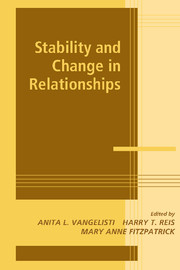Book contents
- Frontmatter
- Contents
- Contributors
- Preface
- PART ONE ACTORS: THE SCAFFOLDING OF STABILITY AND CHANGE
- PART TWO BEHAVIORS: THE PROCESSES OF STABILITY AND CHANGE
- 5 Serial Arguing over the Relational Life Course: Antecedents and Consequences
- 6 Communication, Relationship Concerns, and Satisfaction in Early Marriage
- 7 Sacrifice in Romantic Relationships: An Exploration of Relevant Research and Theory
- 8 Stability and Change in Social Relations: Perspectives from Gerontology and Stress Research
- 9 What Microanalysis of Behavior in Social Situations Can Reveal about Relationships across the Life Span
- 10 Developing a Multifaceted View of Change in Relationships
- PART THREE CONTEXTS: SOCIAL ENVIRONMENTS FOR STABILITY AND CHANGE
- Author Index
- Subject Index
7 - Sacrifice in Romantic Relationships: An Exploration of Relevant Research and Theory
Published online by Cambridge University Press: 21 October 2009
- Frontmatter
- Contents
- Contributors
- Preface
- PART ONE ACTORS: THE SCAFFOLDING OF STABILITY AND CHANGE
- PART TWO BEHAVIORS: THE PROCESSES OF STABILITY AND CHANGE
- 5 Serial Arguing over the Relational Life Course: Antecedents and Consequences
- 6 Communication, Relationship Concerns, and Satisfaction in Early Marriage
- 7 Sacrifice in Romantic Relationships: An Exploration of Relevant Research and Theory
- 8 Stability and Change in Social Relations: Perspectives from Gerontology and Stress Research
- 9 What Microanalysis of Behavior in Social Situations Can Reveal about Relationships across the Life Span
- 10 Developing a Multifaceted View of Change in Relationships
- PART THREE CONTEXTS: SOCIAL ENVIRONMENTS FOR STABILITY AND CHANGE
- Author Index
- Subject Index
Summary
Sacrifice is a construct that has received very little attention in research and theory on intimate relationships. One reason for this neglect may be the controversial nature of sacrificing for one's personal relationships; how sacrifice relates to relationship factors and individual wellbeing is highly disputed. On one hand, some individuals (ranging from clinicians to feminists to individuals who simply have experience in romantic relationships) display strong negative opinions of sacrifice in the context of intimate relationships, suggesting that it is harmful to the individual and associated with “codependency.” Followers of feminist theory go so far as to state that sacrifice is one of the major causes of depression and relationship dissatisfaction in females (Jack, 1991; Lerner, 1988). On the other hand, researchers have recently been reporting the positive role of sacrifice in relationships (Van Lange et al., 1997; Stanley & Markman, 1992). Further, some marital and family theorists (Bahr & Bahr, 1997) have emphasized the need to begin including the concept of sacrifice in marital and family theories because of the crucial, positive role it plays in those relationships. How do we reconcile these different views of sacrifice? Is sacrificing for one's relationship related to positive or negative factors of the relationship? What are its effects at the individual level?
In this chapter, we will explore the existent research and theory surrounding sacrifice, focusing on the question of how sacrifice relates to relationship stability, commitment, and satisfaction.
- Type
- Chapter
- Information
- Stability and Change in Relationships , pp. 156 - 181Publisher: Cambridge University PressPrint publication year: 2002
- 26
- Cited by

